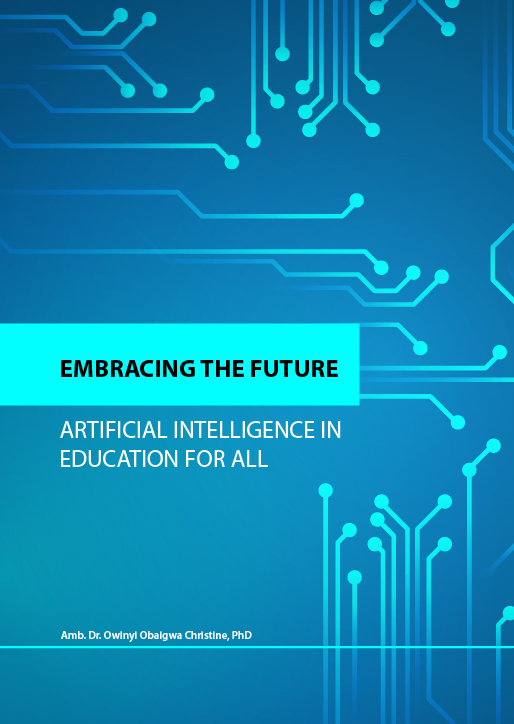
Embracing the Future
Subtitle: Artificial Intelligence In Education For All
Embracing the Future: AI in Education for All by Amb. Dr. Christine Obaigwa Owinyi is an empowering guide to integrating Artificial Intelligence in education. The book demystifies AI, showing how it can revolutionize learning by enhancing personalized education, improving administrative efficiency, and fostering deeper student engagement. Through practical steps, real-world case studies, and tools like ChatGPT and Khan Academy, it equips educators, students, and administrators with the knowledge to leverage AI effectively. At its core, the book emphasizes that AI is not here to replace teachers but to complement them, freeing up time for creative, meaningful interactions with students. It also tackles ethical considerations, such as privacy and fairness, ensuring that AI is used responsibly. Ultimately, this book inspires readers to embrace AI confidently, using it to enhance the human experience in education and build a more innovative, inclusive future for all learners.
Keywords for this book
Book summary
Embracing the Future: AI in Education for All is a comprehensive guide that explores the transformative potential of Artificial Intelligence (AI) in the education sector. Authored by Amb. Dr. Christine Obaigwa Owinyi, the book aims to demystify AI for educators, students, policymakers, and administrators. It addresses the key benefits and challenges of integrating AI into education and provides practical steps for incorporating AI tools into classrooms and institutions. The book begins with a foundational understanding of AI, including its various types, and introduces real-world applications in education. It discusses how AI can enhance personalized learning, streamline administrative tasks, and boost student engagement. Several case studies highlight successful implementations of AI in different educational settings. One of the book’s key strengths lies in dispelling common myths and misconceptions about AI, such as the fear that AI will replace teachers. Instead, the book argues that AI is designed to assist and complement educators by automating repetitive tasks, allowing them to focus more on creative and meaningful interactions with students. A significant portion of the book is dedicated to ethical considerations, such as privacy concerns, data security, and the responsible use of AI in educational environments. It emphasizes the need for transparency and fairness when using AI systems and encourages educators to teach AI ethics to students. The book also includes practical guidelines for educators and administrators, offering step-by-step instructions on how to assess needs, select the right AI tools, and integrate AI gradually. Tools such as Grammarly, Khan Academy, and ChatGPT are discussed, providing educators with tangible examples of AI applications in the classroom. With future-forward thinking, the book envisions how AI will continue to reshape education by providing personalized learning paths, automating grading, and identifying students at risk. However, it maintains that AI should never replace the essential human element in education—emphasizing that technology should enhance, not replace, the teacher-student relationship. Embracing the Future: AI in Education for All serves as both a theoretical resource and a practical guide for anyone interested in harnessing AI to create more effective, ethical, and engaging learning experiences.




